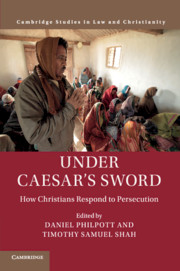Book contents
- Under Caesar's Sword
- Law and Christianity
- Under Caesar's Sword
- Copyright page
- Contents
- Contributors
- Acknowledgments
- 1 Introduction
- 2 On the Brink of Extinction
- 3 To Whom Do We Turn? How Christians Respond to Religious Persecution
- 4 Christians in Egypt, Libya, and Palestine Responding to the Aftermaths of the Arab Revolts
- 5 Christian Responses to Persecution in the Islamic Republic of Iran and the Kingdom of Saudi Arabia
- 6 Christian Repression and Survival in Post-Soviet Central Asia
- 7 Repression, Restriction, and Response in Contemporary Russia
- 8 Christians in Pakistan and Afghanistan
- 9 Christian Responses to Repression in India and Sri Lanka
- 10 Christian Responses to Persecution in Communist Vietnam and Laos
- 11 Evangelization amid Cooperation, Accommodation, and Resistance
- 12 Christians and Multireligious Citizenship in Muslim Indonesia
- 13 Latin America
- 14 Western Christians' Responses to Denials of Religious Freedom
- 15 Christian Transnational Networks Respond to Persecution
- Glossary
- Index
14 - Western Christians' Responses to Denials of Religious Freedom
Published online by Cambridge University Press: 26 February 2018
- Under Caesar's Sword
- Law and Christianity
- Under Caesar's Sword
- Copyright page
- Contents
- Contributors
- Acknowledgments
- 1 Introduction
- 2 On the Brink of Extinction
- 3 To Whom Do We Turn? How Christians Respond to Religious Persecution
- 4 Christians in Egypt, Libya, and Palestine Responding to the Aftermaths of the Arab Revolts
- 5 Christian Responses to Persecution in the Islamic Republic of Iran and the Kingdom of Saudi Arabia
- 6 Christian Repression and Survival in Post-Soviet Central Asia
- 7 Repression, Restriction, and Response in Contemporary Russia
- 8 Christians in Pakistan and Afghanistan
- 9 Christian Responses to Repression in India and Sri Lanka
- 10 Christian Responses to Persecution in Communist Vietnam and Laos
- 11 Evangelization amid Cooperation, Accommodation, and Resistance
- 12 Christians and Multireligious Citizenship in Muslim Indonesia
- 13 Latin America
- 14 Western Christians' Responses to Denials of Religious Freedom
- 15 Christian Transnational Networks Respond to Persecution
- Glossary
- Index
Summary
- Type
- Chapter
- Information
- Under Caesar's SwordHow Christians Respond to Persecution, pp. 428 - 455Publisher: Cambridge University PressPrint publication year: 2018
- 1
- Cited by



